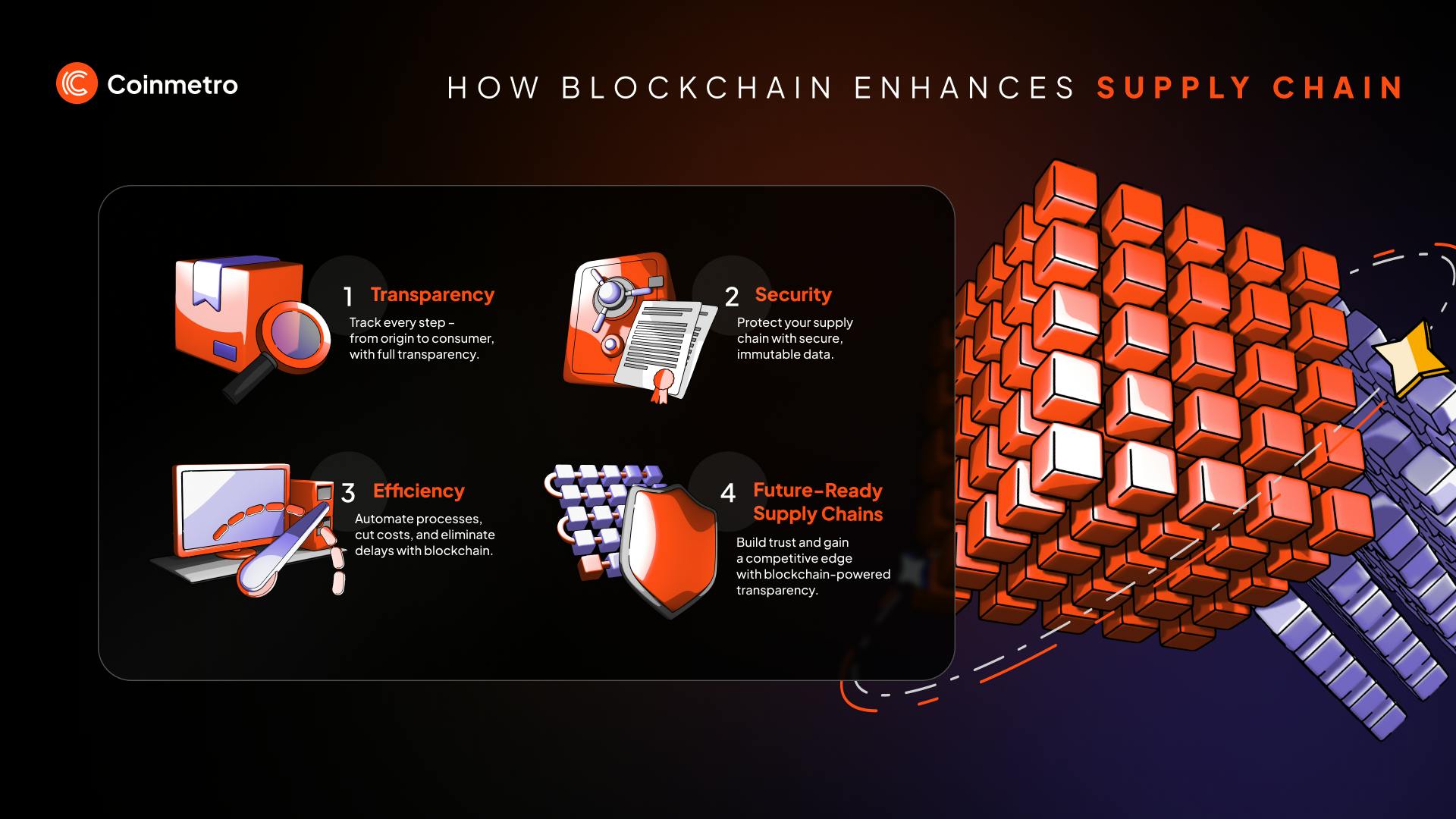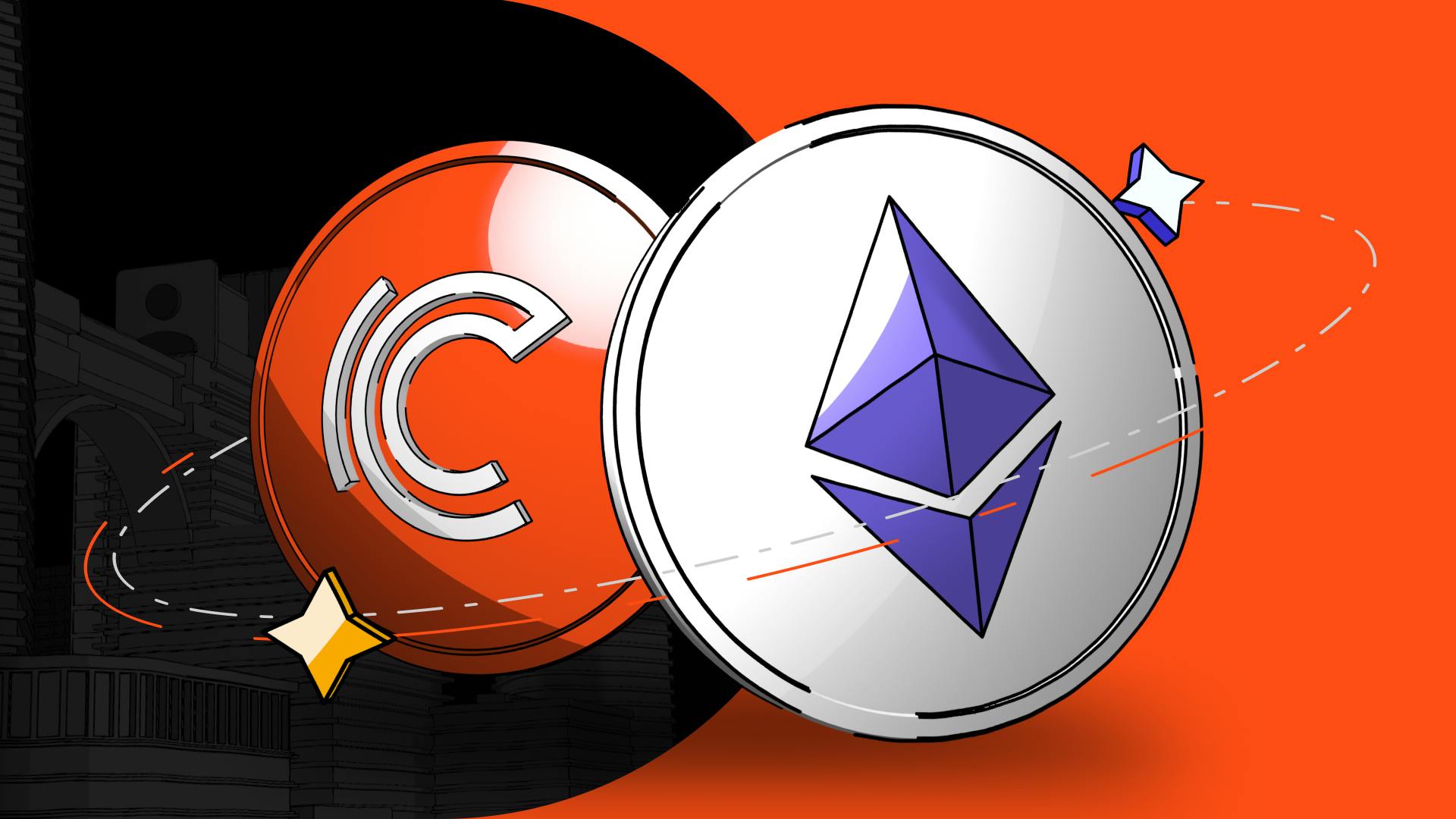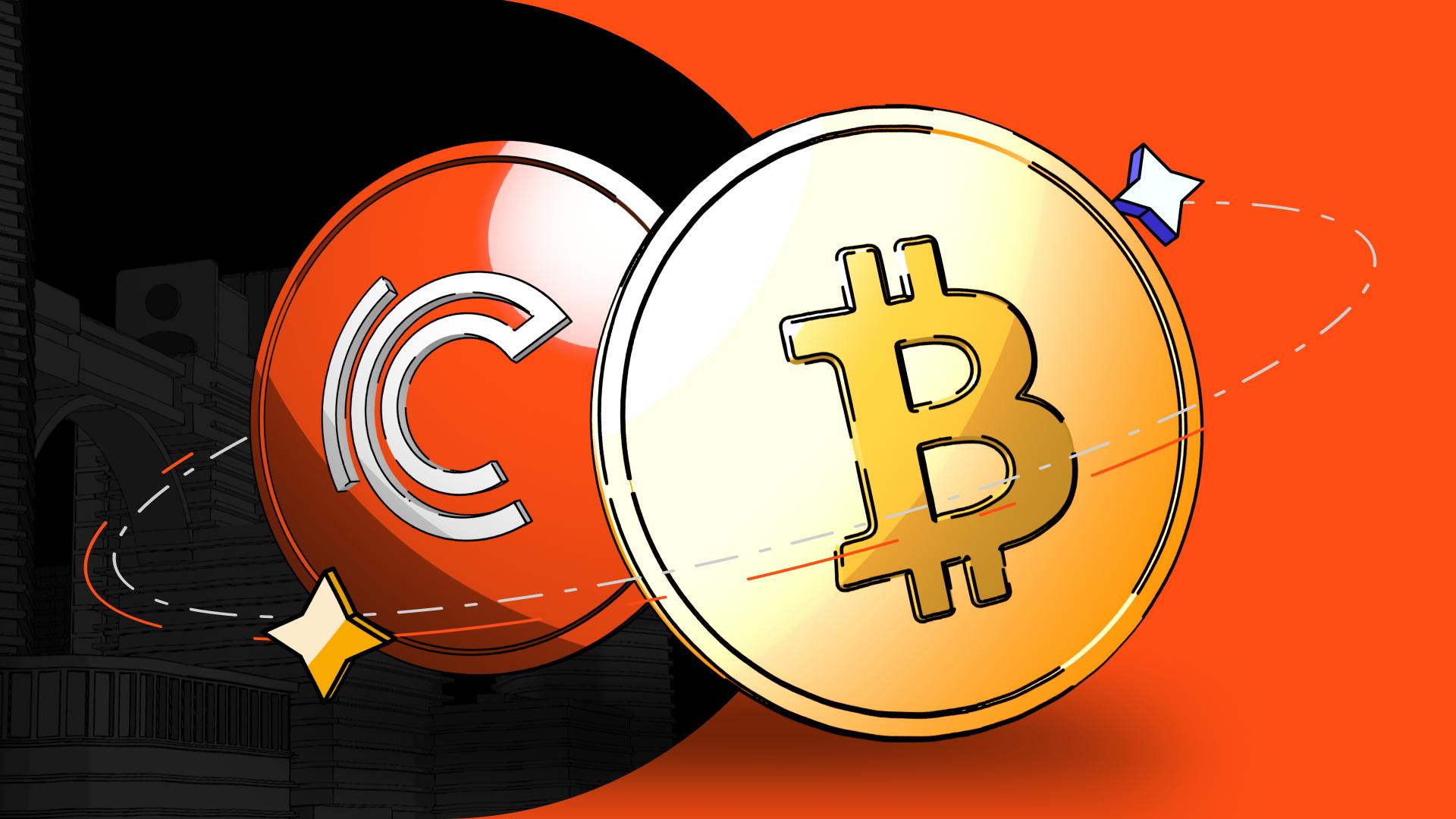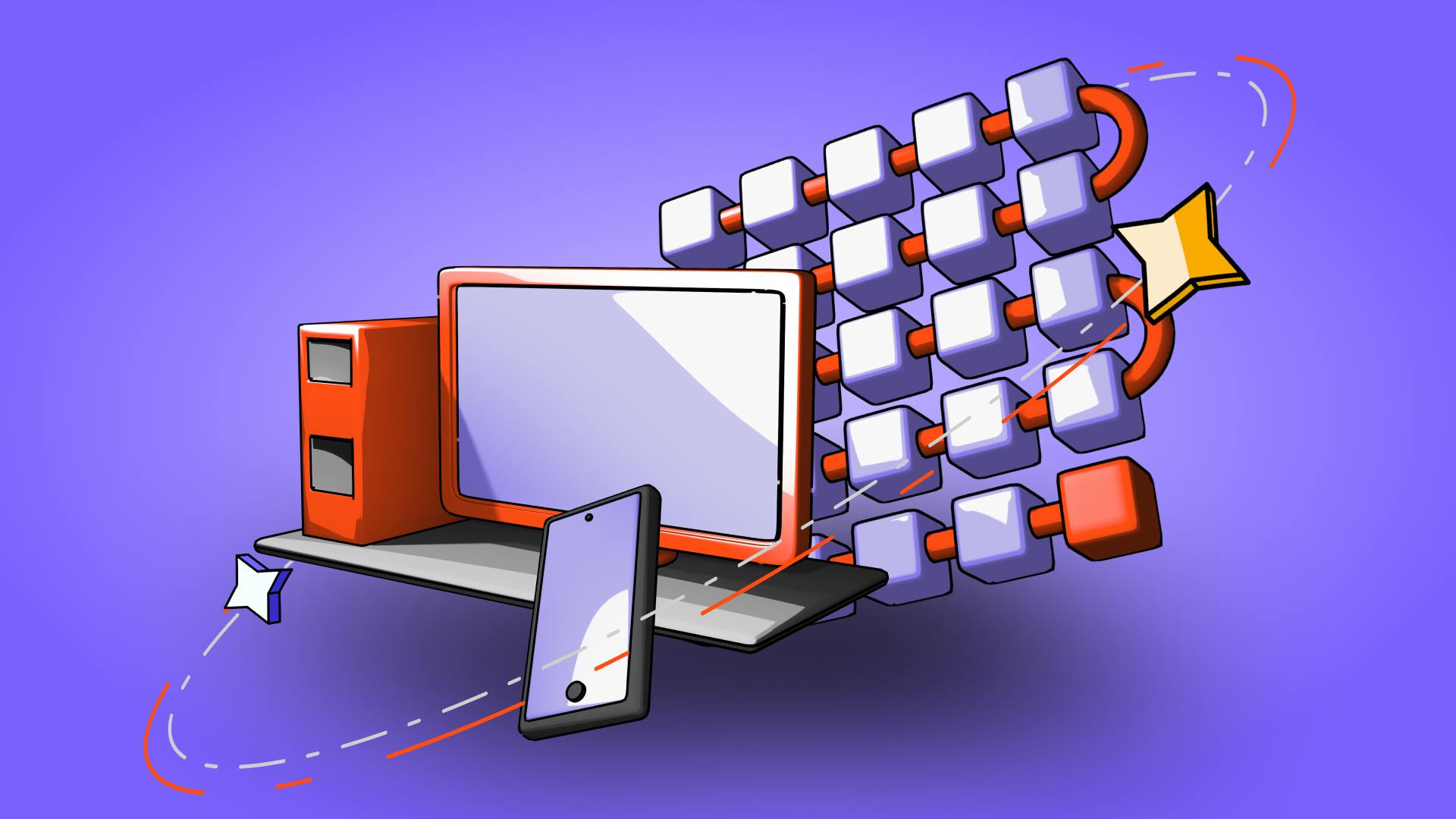The Role of Blockchain in Supply Chain Traceability
May 27, 2025

by Coinmetro Editorial Team
May 27, 2025
In 2021, a scandal rocked the food sector. Several suppliers had mislabeled expired meat and sold it as fresh. The result was public outrage and major financial loss for companies involved.
A report by McKinsey & Company found that fraud and inefficiencies in global supply chains cost over $2 trillion per year. This reflects the limits of legacy systems built on siloed data, manual entries, and poor oversight.
Supply chain traceability means tracking products, components, and materials from origin to final sale. It supports safety, authenticity, and regulatory compliance. Blockchain strengthens traceability by logging events on a shared, tamper-proof ledger. Each step—production, storage, and transit—is recorded with a timestamp and is visible to all approved parties. Smart contracts add automation. They enforce rules, halt risky shipments, and reduce manual errors. This blog will explore how blockchain improves traceability, builds trust, limits fraud, and drives smarter, faster supply chain decisions.
This blog will outline:
- The need for traceability in supply chains
- How blockchain enhances supply chain traceability
- Case studies of blockchain in supply chain
- Implementation challenges
- Future outlook
Discover The Future of Programmable Money: Smart Contracts in Finance
Supply chain traceability is vital for quality, compliance, and risk control. Traditional systems struggle to provide the speed, clarity, and accuracy that modern logistics require. Blockchain offers real-time tracking, data integrity, and shared visibility across all stakeholders.
By adopting blockchain, businesses enhance transparency, meet compliance demands, and protect supply chain integrity. Consumers also gain confidence, knowing the products they buy are safe, authentic, and properly handled.
Lack of transparency: When goods move through disconnected systems, errors and fraud become more likely. Without real-time tracking, inventory levels can be wrong. Shipments get lost, delayed, or misrouted, leading to higher costs and lower customer trust.
Complexity of supply networks: Modern supply chains involve many parties. Suppliers, manufacturers, shippers, and retailers often operate in silos. This lack of coordination slows down communication, increases mistakes, and makes it harder to resolve problems quickly.
Regulatory compliance: Industries like food, pharmaceuticals, and electronics face strict rules. These rules require accurate tracking across every step. Without a reliable system, meeting legal requirements is hard. Failure to comply risks fines, penalties, and brand damage.
Blockchain improves traceability by logging events on a tamper-proof, shared ledger. It verifies every movement and makes that data accessible. This reduces fraud, simplifies audits, and supports faster, more accurate decisions.
Consumer trust: Traceability builds trust by verifying a product’s source, quality, and authenticity. Today’s consumers expect proof that goods are safe, ethical, and accurately labeled. By tracing every step from origin to shelf, brands can confirm claims around sustainability and responsible sourcing. This visibility increases buyer confidence and long-term loyalty.
Quality control: Tracking products throughout the supply chain supports better quality control. With a full record of each step, companies can quickly detect issues and fix them. This level of oversight helps maintain consistency, reduce defects, and limit the risk of recalls or safety failures.
Risk management: Traceability improves recall readiness and protects against counterfeits. If a defect arises, firms can quickly locate and remove affected goods, limiting harm and legal exposure. Authentication at each stage also helps block fake or diverted products from reaching stores. That added control protects consumers and preserves brand integrity.
Learn About Companies & Banks Investing In Crypto & Blockchain
Real-time tracking: Blockchain allows real-time tracking of goods from origin to end consumer. Each transaction or movement of goods is recorded on the blockchain, providing a transparent and immutable ledger that all stakeholders can access. This real-time visibility ensures that everyone in the supply chain knows the product's status at any given moment, reducing the risk of errors and fraud.
Shared ledger: A shared ledger ensures all participants access the same information, reducing discrepancies. By using a decentralized database, blockchain eliminates the need for intermediaries to verify transactions, thus minimizing the potential for human error and conflicting records. This shared ledger approach enhances trust among stakeholders as they can independently verify the data's accuracy.
Automated processes: Smart contracts can automate and streamline processes, reducing manual intervention. These self-executing contracts are programmed to execute specific actions when certain conditions are met, such as releasing payment when goods are delivered. This automation reduces the need for manual checks and approvals, speeding up transactions and lowering administrative costs.
Reduced delays: Blockchain minimizes delays by providing a single source of truth for all participants. With all data stored on a decentralized ledger, multiple parties do not need to maintain and reconcile their records. This unified approach reduces the time spent verifying and validating information, ensuring that goods move through the supply chain more quickly and efficiently.
Data integrity: Blockchain's immutability ensures that recorded data cannot be tampered with. Once a transaction is recorded on the blockchain, it is nearly impossible to alter or delete, providing a secure and trustworthy record of all supply chain activities. This immutability helps maintain data integrity and prevent fraudulent activities.
Fraud prevention: Blockchain helps prevent fraud by providing a transparent and unalterable record of transactions. Every participant in the supply chain can view a product's entire history, from its origin to its current location. This transparency makes it difficult for bad actors to introduce counterfeit goods or manipulate records without detection.
Learn More About Using Blockchain to Drive Supply Chain Transparency

Overview: Walmart uses IBM's Food Trust blockchain to trace food products from farm to store. This platform records every step of the food supply chain, from the farm where the food is grown through the processing and shipping stages to the store where it is sold.
Impact: The implementation of IBM's Food Trust has significantly improved transparency and reduced the time required to trace the origins of food products from days to mere seconds. This enhanced traceability helps Walmart ensure food safety, quickly identify and address issues, and build consumer trust by providing verifiable information about the products' origins.
Overview: Similar to Walmart, Carrefour, a multinational retail corporation, also uses IBM's Food Trust blockchain to track and verify the journey of its food products. This system enables Carrefour to trace a broad spectrum of agricultural products from the farm to the shelf.
Impact: Carrefour has increased transparency and consumer trust by utilizing blockchain technology. Customers can scan QR codes on products to access detailed information about the product’s journey, including origin, processing steps, and transportation details. This has enhanced food safety, ensured product authenticity, and improved customer experience.
Overview: Provenance is a platform that leverages blockchain technology to ensure the authenticity of products, particularly in the food and fashion industries. The platform tracks and verifies the journey of products from their origin to the consumer, providing a transparent view of the supply chain. Provenance works with companies like Unilever, Sainsbury's, and Patagonia to enhance transparency and traceability.
Impact: Using blockchain technology, Provenance significantly benefits companies and consumers. Companies gain improved transparency, which helps build consumer trust and enhance brand reputation. Consumers benefit from knowing the origins and authenticity of their products, ensuring ethical and sustainable practices are followed.
Opportunities and Challenges in Blockchain for Supply Chain Traceability
Integration with Existing Systems: Integrating blockchain into supply chain operations remains a major challenge. Most firms still run on legacy systems that were not designed for decentralized technology. These systems need substantial changes, including software upgrades, process redesign, and team retraining. Integration demands time, planning, and budget, and must avoid disrupting daily logistics.
Scalability Issues: Scalability limits blockchain’s use in high-volume supply chains. Many platforms cannot handle the number of transactions needed daily. Delays and congestion may arise when multiple parties submit data at once. To meet enterprise requirements, blockchain networks must evolve to process larger transaction loads quickly and reliably.
Compliance with Regulations: Unclear global regulations remain an obstacle to blockchain adoption in supply chains. Countries differ on rules for data storage, transmission, and blockchain use. Navigating these legal frameworks requires time, expertise, and strong compliance planning. Failing to meet legal obligations may lead to penalties and stalled deployment.
Data Privacy Concerns: Laws like the General Data Protection Regulation (GDPR) impact how blockchain can be used. Blockchains are immutable, which means once data is added, it cannot be altered or erased. This directly conflicts with GDPR’s right to erasure in some jurisdictions. Companies must design hybrid systems or off-chain solutions to comply with privacy laws while using blockchain’s benefits.
Stakeholder Resistance: Many stakeholders resist blockchain because they are used to legacy systems. Concerns about complexity, control, or job disruption often delay adoption. These doubts can stall deployment even when the benefits are clear. To succeed, companies must offer training and show measurable value to win stakeholder trust.
Cost of Implementation: Building blockchain infrastructure requires capital, time, and skilled labor. Custom development, integration, and security drive initial costs. Training staff and maintaining the system add further expense. To justify adoption, firms must weigh costs against blockchain’s long-term gains in speed, trust, and operational resilience.
The future of blockchain in supply chains looks strong. As technology evolves, we’ll see major advances in how companies track, verify, and optimize supply flows. Still, widespread global adoption will require solving key technical, operational, and regulatory hurdles.
Blockchain developers are improving scalability and speed. Solutions like sharding and layer-two protocols will allow networks to handle more transactions per second. This will make blockchain more usable for complex, high-volume supply chains.
More businesses recognize blockchain’s role in boosting supply chain efficiency and trust. Early adopters gain an edge through better visibility and fewer errors. As proven use cases grow, adoption will accelerate, driving even more innovation across industries.
Governments and regulators are beginning to offer clearer guidance for blockchain use. New rules will help companies stay compliant while using decentralized systems. Better clarity around data privacy, cross-border transfer, and storage will support broader implementation.
Today’s consumers want transparency in how products are sourced, made, and delivered. Blockchain meets this demand by offering a verifiable product history. Brands that deliver this visibility are more likely to earn loyalty and repeat business.
Upfront costs are high, but blockchain reduces waste, fraud, and paperwork. Over time, this leads to leaner operations, faster reconciliation, and lower administrative overhead. As ROI becomes clearer, blockchain will be seen as a strategic investment.
Blockchain solves critical challenges in global supply chains — enhancing trust, speed, and control. Businesses that invest early can build systems that are future-proof, efficient, and resilient. As leaders show what’s possible, the path to mainstream adoption becomes clearer. The companies moving now are shaping the future of supply chain transparency and accountability, offering consumers greater confidence in the authenticity, origin, and integrity of the products they choose.
▶️ Watch: Blockchain in Supply Chain and Its Implementation
Join the Coinmetro community on Discord and Telegram, where forward-thinking traders and investors gather to share insights, explore new opportunities, and dive deep into cryptocurrencies. Should you need any help, please contact our world-class Customer Support Team via 24/7 live chat or email at hello@coinmetro.com.
To become a Coinmetro user today, Sign Up now, or head to our new Exchange if you are already registered to experience our premium trading platform.
Tags
Related Articles

How to Buy Ethereum (ETH) on Coinmetro - Step by Step
Want to buy Ethereum instantly without the complexity? Coinmetro makes it fast, simple, and secure. This guide shows you the simple steps to buy…
2m

How to Stake Ethereum (ETH) on Coinmetro Fast, Easy, and Securely
Looking to earn passive income on your Ethereum? With Coinmetro, staking ETH is seamless, secure, and beginner-friendly. In this quick guide, you’ll…
2m

How to Buy Bitcoin (BTC) Instantly on Coinmetro
Want to buy Bitcoin instantly without the complexity? Coinmetro makes it fast, simple, and secure. This guide shows you the simple steps to buy…
2m

Blockchain for IoT (Internet of Things): Enhancing Device Connectivity
The Internet of Things (IoT) hit 17.08 billion devices in 2024. Experts predict this will grow to 29 billion by 2030. IoT now connects consumer…
8m